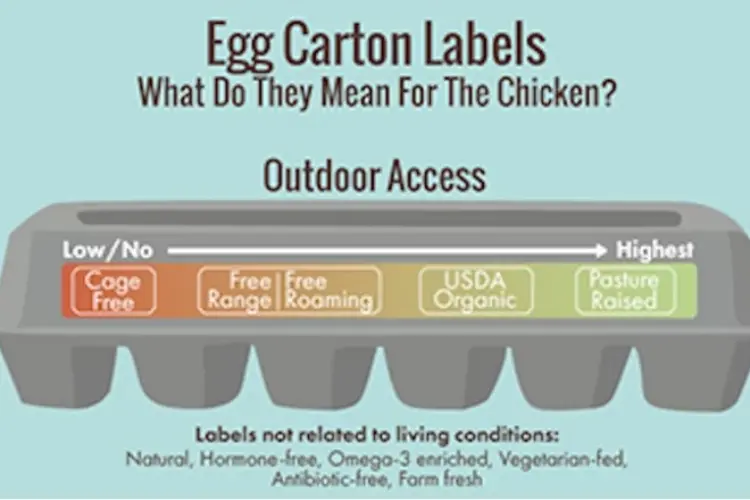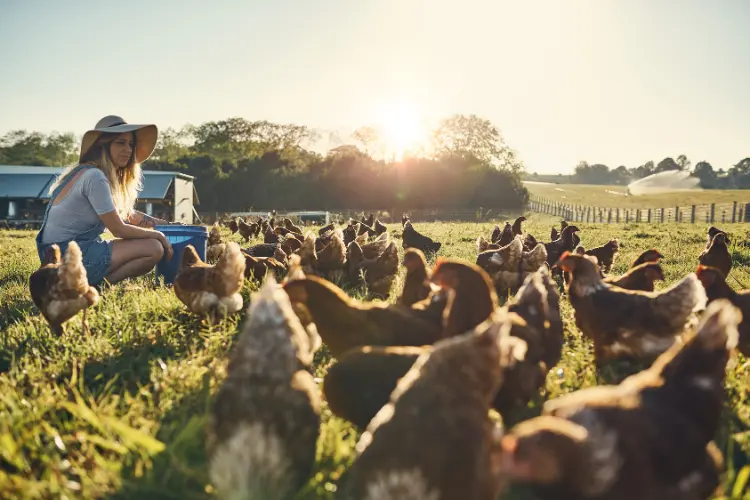Free Range vs Pasture Raised Eggs: All About Egg Labels
In today’s bustling grocery stores, navigating the egg aisle can be a perplexing experience, as egg cartons are adorned with an array of labels, each claiming to offer a unique benefit.
Are pasture-raised eggs superior to free-range, or should you opt for organic?
Is the choice between cage-free, free-range, or pastured just a matter of semantics, or does it signify a genuine difference in quality?
These questions often swirl in the minds of consumers seeking to make informed choices about the eggs they bring home.
In this article, we will break down the details of various egg labels and explore the pros and cons of pasture-raised eggs, free-range eggs, and other alternatives, ultimately helping you decipher the egg-labeling jargon and make the best decision for your dietary preferences and values.
So, let’s dive in and unravel the mysteries of the egg industry.

Caged (Conventional Eggs): Unveiling the Standard
Among the egg labels, “caged” or “conventional” eggs represent the most prevalent and budget-friendly option available in grocery stores.
These eggs are produced by caged hens, following traditional industrial farming practices.
However, understanding what “caged eggs entail is crucial, as they often evoke discussions about animal welfare, environmental impact, and the quality of the final product.
The Environment and Space
Caged egg production systems typically involve confining or raising hens to small cages, which can be quite restrictive regarding space. These cages are usually designed to maximize efficiency and minimize labor costs, with multiple hens kept nearby.
While this approach can lead to higher egg production rates, it raises concerns about animal welfare, as the hens have limited space to move, spread their wings, or engage in natural behaviors.
Health and Nutrition
In terms of the eggs themselves, they normally meet basic nutritional standards. They contain essential nutrients such as protein, vitamins, and minerals, making them a viable source of nutrition.
However, some consumers express concerns about the potential for lower egg quality due to the stressful conditions in which caged hens are raised.
Economic Considerations
Caged eggs are often the most cost-effective choice for consumers, making them an appealing option for individuals on tight budgets. These eggs are widely used in various food products, including baked goods and processed foods, due to their affordability.
Cage-Free Eggs: A Glimpse into a More Humane Farming Practice
The term “cage-free” has gained traction in recent years as consumers increasingly seek out eggs produced under more humane conditions.
Cage-free eggs represent a significant departure from conventional caged egg production, addressing some of the animal welfare concerns associated with small, restrictive cages.
In this section, we will explore what cage-free eggs entail and what sets them apart in the world of egg labeling.

Freedom of Movement
The hallmark of cage-free egg production is that hens are not confined to small cages. Instead, they live in indoor environments with significantly more space to move around.
While they may not have access to the outdoors like free-range or pasture raised hens, cage free systems aim to provide hens with better living conditions by allowing them to walk, perch, and engage in natural behaviors.
Egg Quality
Cage-free eggs often exhibit characteristics that fall between caged and more premium egg options.
While they may not have the same access to outdoor foraging and diverse diets as free-range or pasture raised hens, cage-free eggs can still offer improved flavor and yolk color compared to conventional caged eggs.
The cage free hens’ ability to move and engage in natural behaviors can influence the nutritional profile and taste of the eggs.
Read also: Brown Eggs vs White Eggs – The True Difference
The Certified Humane Label
The Certified Humane Free Range standard is a certification program that sets strict guidelines for humanely treating farm animals, particularly egg laying hens in egg production.
Under this certification, hens have more spacious living conditions than conventional cage systems. They have access to the outdoor space, allowing them to engage in natural behaviors like scratching, perching, and foraging.
This standard emphasizes the importance of allowing hens to express their instincts while ensuring their well-being through regular access to clean water, nutritious food, and appropriate shelter.
Certified Humane Free Range aims to balance animal welfare and egg production, assuring consumers that their eggs come from hens that have enjoyed a higher quality of life in a free-range environment.

Free-Range Eggs: A Step Towards Ethical and Healthier Choices
Amid the spectrum of egg labels, “free-range” eggs stand as a middle ground between conventional caged eggs and more premium options like pasture-raised or organic eggs.
This labeling implies that hens have access to the outdoors, providing them with more space and freedom compared to their caged counterparts.
Let’s delve into what makes free-range eggs a popular choice for many consumers.
How Much Space Do Free Range Hens Have?
The amount of outside space that free-range hens have can vary depending on the specific farm and its practices. However, there are general guidelines and standards that many certification programs and regulatory bodies recommend for free-range egg production.
In the United States, for example, the USDA (United States Department of Agriculture) does not have specific space requirements for free-range hens, but it does require that they have “access to the outdoors.” The term “access” can be somewhat ambiguous, and it doesn’t specify a minimum amount of space per bird.
Certification programs like Certified Humane, which I mentioned in a previous response, have more detailed standards. Under Certified Humane Free Range, each hen is typically required to have at least 2 square foot of outdoor space. However, the exact space allocation can vary by certification and region.
It’s essential to keep in mind that while free-range hens have access to the outdoors, the quality and size of the outdoor area can vary significantly from one farm to another. Some farms may provide more extensive outdoor spaces with opportunities for foraging and natural behaviors, while others may have more limited access.
If you’re concerned about the living conditions of hens in a specific egg production system, you may want to look for certifications like Certified Humane or research the specific practices of the egg producer to get a better understanding of the space and conditions provided to the hens.

Egg Quality
In terms of egg quality, free-range eggs may exhibit some differences compared to caged eggs.
Hens with outdoor access often have a more varied diet, including grass, insects and plants, which can influence the flavor and nutritional profile of the eggs.
Some consumers prefer the taste and texture of free-range eggs, noting that they have a richer flavor and deeper yolk color.
Benefits of Pasture Raised Eggs
Pasture-raised eggs offer several benefits that can make them an attractive choice for consumers who prioritize nutrition.
Higher Nutritional Value:
Pasture-raised eggs often have a superior nutritional profile. They typically contain higher levels of vitamins (such as vitamin A, vitamin E, and vitamin D) and omega-3 fatty acids. The hens’ diverse diet from foraging on plants and insects can contribute to these nutritional enhancements.
Richer Flavor:
Many consumers find that pasture-raised eggs have a more robust and flavorful taste. The hens’ varied diet and continuous access to outdoor space can influence the taste and color of the yolks.
Environmental Sustainability:
Some pasture-raised egg producers implement sustainable farming practices that can benefit the environment. Rotational grazing systems, for example, can help improve soil health and reduce environmental impact.
Transparency and Accountability:
Certification programs like “Certified Humane” and “American Humane Certified” offer standards for pasture-raised egg production. These certifications provide transparency and accountability, assuring consumers that the eggs they purchase meet specific animal welfare and environmental criteria.
Support for Local Agriculture:
Many pasture-raised egg producers are small, local farms. Choosing pasture-raised eggs can support local agriculture and promote sustainable farming practices within your community.
Reduced Antibiotic Use:
Some pasture-raised operations prioritize natural and holistic approaches to animal health, reducing the reliance on antibiotics commonly used in conventional farming.
Other Egg Labels
Omega-3 enhancements
Omega-3 addition labels do not suggest much, and also they are primarily an advertising and marketing scheme that usually indicates they simply added a little bit of flaxseed to the hen or chicken feed for the specific purpose of this label.
Organic
Eggs with USDA’s National Organic Program tag are from cage-free or uncaged hens that have the “freedom to roam in their homes” and also “accessibility to the outdoors”. They are fed organic diet plans without standard chemicals or plant foods. While always great to see, treat this with similar caution to cage-free and also free-range.
Egg Quality
Eggs are provided grades (B, a, or aa) based upon indoor high quality aspects like defects and freshness, as well as exterior factors showing shell features [*]
Grade A eggs have thick whites (AA are also thicker), making them great for frying. Grade B are a bit thinner and also far better for omelets as well as cake blends.
All-Natural
This term merely suggests that nothing was added to the egg. All eggs satisfy this standard, making this label basically pointless.
Eggs with USDA’s National Organic Program label are from cage-free or uncaged chickens that have the “freedom to stroll in their residences” and “access to the outdoors”.
They are fed organic diets without traditional chemicals or fertilizers. While always excellent to see, treat this with comparable care to cage-free as well as free-range.
Conclusion: Free Range vs Pasture-Raised Eggs
In the ever-evolving landscape of egg choices, consumers are met with a diverse array of options, each with its own set of advantages and considerations.
Conventional caged eggs remain the most budget-friendly choice, while cage-free eggs offer improved hens welfare without a significant increase in cost.
Free-range eggs balance ethics and accessibility, providing hens with outdoor access.
Pasture-raised eggs go further, offering hens ample space and a more varied diet, resulting in enhanced flavor and nutrition.
Organic eggs, with their emphasis on organic farming practices, appeal to those seeking a healthier and more environmentally sustainable option.
By understanding the differences and benefits of each option, consumers can make informed decisions that align with their preferences.




